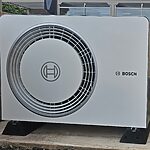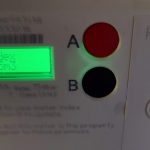Poorly performing R32 LT Daikin monobloc - is this normal?
I’m hoping you can all help me with our new Daikin EBLA09DA3V3 i.e. 9kW, low temperature, R32. I think it’s performing much worse than it should and I’d like you to tell me I’m not being unreasonable. Apologies for the long post but I thought I would get as much information out there to start with.
The heat pump installed behind a garage feeding a hot water cylinder inside the garage. The DHW and CHW are both fed into the house underground a few metres in insulated pipes.
The house is a 1930s semi-detached inCambridge with a recent loft extension. The loft extension is well insulated and the rest is pretty good given the age - internal insulated plasterboard up to 50mm thick in many places and insulation under the suspended wooden floor. The ground floor is UFH and the 1st & 2nd floors are feed via air ducts from an water -> air heat exchanger ( https://www.invisible.ac/), so we are able to run at low temperatures. I currently have the WC curve set to 40C at -5C ambient and 25C at 15C ambient. The reason I’ve got that slightly odd curve is that Daikin’s minimum temperature is 25C and so I can’t set any value on the curve lower than that. I’m on dumb thermostats across multiple zones in the house, but they’re each set back by only a couple of degrees overnight. I did have the flow temperature set back overnight on a schedule but that option seems to have disappeared in a firmware update to the Daikin controller (a real pity since that feels like the best way to reduce temperatures overnight i.e. don’t use thermostats, but instead dial back your flow temp). We also have the thermostats set back during week days since we’re at work, but again only a couple of degrees.
There is no low loss header or volumiser. A LLH was originally planned and partially installed before I queried it. The installer then did the sums and concluded that there was enough volume in the under ground pipes (never mind the house) to meet Daikin’s minimum volume requirements. That exchange didn't fill me with confidence to be honest.
I don’t have a full heat loss survey but the performance estimate has a required heating capacity of 6.1kW at -5.9C i.e. we’re comfortably sized with our 9kW unit (to be honest one of my concerns is that we’re oversized since I don’t think the full heat loss calcs take into account the upgraded insulation).
DHW is set to heat to 47C between 0230 and 0400 in the morning, and heat to 45C if it ever drops below 40C - which happens surprisingly often in a two person household. I also think we have far too much heat loss from the DHW cylinder, but that’s not my most pressing problem.
Anyway, the Daikin controller will tell us a total energy produced and consumed for each of CH and DHW. I’ve been recording those every evening and so I’m able to calculate a daily average COP. There are obvious problems with that since I don’t know how accurate the Daikin’s temperature and flow rate sensors are for the heat production and it only reports in whole kWh so there is obviously some rounding error. Over the last month I’m seeing CH COPs of between 1.9 and 3.3. There is some correlation between ambient temperatures and the measured COP - the better numbers are more recent but I attribute that to the warmer weather. However, given the flow temperatures we’re running that feels far too low.
A good example would be 4 February, which was a Saturday so the heating was on all day. The ambient was vey steady, between 6.0C and 8.0C, according to the weather station just down the road. That feels like very good heat pump weather and on our WC curve flow temps would be 31C or 32C flow temps so we ought to be getting amazing performance. Yet we used 7kWh electrical and generated 18 kWh thermal for CH, for a COP of 2.6 on that day. According to the Daikin data sheet here (page 56) we should be getting a COP of around 5 at those temps:
https://www.acae.es/catalogos/daikin/fiebdc/e-b-d-la09-16d-3-v3-w1-eeden20-data-books-english.pdf
The COPs for DHW are similarly dismal, down as low as 1.2. Of course these will be lower given the higher temps for DHW, but still that feels far too low.
One thing that is abundantly clear to me from these forums is that the whole system design should be examined. However, I would expect problems there to manifest themselves in lots of compressor starts and I’m not seeing much sign of that. Unfortunately the Daikin controller doesn’t have a restart counter, which I think is incredibly dumb because it would be a great tool for them to point the finger of blame at the installer. However, just looking at the screen it looks to me like the compressor is typically on for extended periods of time and there is no sign of cycling that I can discern.
I understand that the real world and the data sheet numbers will be different but I would expect us to get much closer to the data sheet than that. Is that an unreasonable expectation?
Side note: I actually asked for a Daikin engineer to come out a little over a week ago since I think they need to take a look at this. I still don’t have an appointment for that.
Did you ever get to the bottom of this my setup sounds similar with similar problems ?
My thinking has certainly moved on since then but I’m far from a resolution.
One thing that is now very clear is that the system is grossly oversized. In the actual heat loss calculations from the vendor they think the heat loss is 5.1kW, in contrast with the 6.1kW figure they had in their performance estimate. Either of those indicate that the 9kW heat pump is absurdly oversized for the house. In fact it's even worse than that since, as I suspected, they haven't taken into account some of the insulation improvements we've made. So, even following conservative MCS heat loss methodology my calculations suggest a heat loss of around 4.2kW. I'm in the throes of putting together quotes to replace the heat pump with something smaller in order to put together a legal claim against the installer since this shows they really dropped the ball with the sizing and they're being very slow to admit that self-evident fact.
What makes the situation more complicated is that the DHW performance is still extremely poor. I'm only heating the cylinder to 47C (either when the temperature drops to 37C or daily - it doesn't make a difference) and I'm only getting a DHW SCOP of 2 in East Anglia. Given that the heat pump is heating a cylinder from the same manufacturer which is a mere 2 metres away. I can't conceive of a situation where system design could possibly impact that, so I think there also must be something wrong with the heat pump. Daikin have been worse than useless in trying to find a solution to that. The first two engineers they sent out didn't know anything. A more recent one was fine but didn't find a root cause.
That leaves me with an installer who is responsible for the system design and sizing and the manufacturer who is responsible for the heat pump itself. It's a pain but hopefully legal action will raise the temperature enough so I can get some movement.
My heat pump isn't Daikin but same rules apply, it's 6kW, it could be 3kW for heat loss.
Zones, make into a single zone, any zoning can lead to small area to output the heat - leading to short cycling, poor defrost, reduced circulation - more short cycling.
Big heat pump can work but you need to work on commissioning yourself. Small heating areas don't work, you need to get loads of flow through the system and lots of engaged water volume - 9kW in the region of 90L to stop short cycling.
Don't do set backs. The heat pump plays catch up running flat out until it gets back into balance. Two set backs, one out at work and night means it never gets to steady state = big consumption.
All the thermostats set to 3 Deg above target room temp, then balance the rads or floor loops to get room temp correct. One big zone, run 24/7.
If I leave the heat pump to manage the cylinder it does it 4 or 5 times a day, each time the thermal current stir up the whole contents of the cylinder and heating takes 45 mins. If I set times (X2) it still only takes 45 minutes each time, we never run out of water. Set to timed operation, to get better use of your energy. The trouble is the temperature probe is near the bottom of the cylinder so you run the tap a few times the bottom few inches is cold, but the rest of the tank is hot. But you get a demand to heat cylinder. Really good you may get 2.5 CoP in good weather, most the time it's worse.
Posted by: @Anonymous...
Don't do set backs. The heat pump plays catch up running flat out until it gets back into balance. Two set backs, one out at work and night means it never gets to steady state = big consumption.
...
Whilst you're correct in your technical thinking, @johnmo, I'd still inject a word of caution.
Any means of heating one's house and domestic water is for one's comfort. Any solution that is a significant compromise on comfort is not a workable solution. If you are happy with a house at a constant temperature then that's fine and dandy. If, like my wife and me, you can't sleep when it's too warm and are too cold if a comfortable night-time temperature is maintained during the day then setbacks are simply necessary. If so, it's a process of finding out the least inefficient compromise that still provides the home environment deemed necessary.
As a result, I wouldn't say "don't do set backs"; I'd prefer the message "think carefully before implementing set backs". In other words, never say never but go in eyes wide open.
105 m2 bungalow in South East England
Mitsubishi Ecodan 8.5 kW air source heat pump
18 x 360W solar panels
1 x 6 kW GroWatt battery and SPH5000 inverter
1 x Myenergi Zappi
1 x VW ID3
Raised beds for home-grown veg and chickens for eggs
"Semper in excretia; sumus solum profundum variat"
Posted by: @majordennisbloodnokI'd prefer the message "think carefully before implementing set backs
Sounds fair. But the OP needs to move away from many thermostats and multiple setbacks and implement a steady state setup assess energy consumption and comfort compared to now. Then move forward from there. Comprising comes after understanding what does or doesn't work.
I didn't do any of the above last year I did batch heating - using UFH and slab as a big storage heater. Cost less than gas, due to mostly cheap rate electric and battery, but I did use a lot of kWh's. More than I am comfortable with. This year I will be practicing what I preach, if only to understand the whole benefit . So zero setbacks - in fact no thermostat or timers, just straight WC, across a 195m2 bungalow and summer house. Been doing cooling that way for the last month or so and it's worked really well.
…and there I can agree, @johnmo. You’re describing a textbook case of simplifying a problem to understand it better and it’s sound advice. Mine was only a note of caution because we can all get wrapped up in improvements whilst forgetting what we’re actually trying to achieve, and as long as that end goal is understood and kept in sight real progress will be made.
105 m2 bungalow in South East England
Mitsubishi Ecodan 8.5 kW air source heat pump
18 x 360W solar panels
1 x 6 kW GroWatt battery and SPH5000 inverter
1 x Myenergi Zappi
1 x VW ID3
Raised beds for home-grown veg and chickens for eggs
"Semper in excretia; sumus solum profundum variat"
@mark-h did you eventually get this matter resolved with the installer?
Get a copy of The Ultimate Guide to Heat Pumps
Subscribe and follow our YouTube channel!
- 27 Forums
- 2,475 Topics
- 56.9 K Posts
- 238 Online
- 6,165 Members
Join Us!
Worth Watching
Latest Posts
-
RE: If a heat pump can only heat DHW to 50C then what? Issue with 18KW Heliotherm heat pump
Hi, Nothing yet. I've asked customer to measure flow...
By errmm , 4 hours ago
-

RE: High Temp Heat Pumps for fast warm-up of house
I don't know exactly how long it takes to heat up (and ...
By JamesPa , 5 hours ago
-

RE: Need help maximising COP of 3.5kW Valiant Aerotherm heat pump
OK. What Im seeing looks fairly normal TBH: 1 start ...
By JamesPa , 6 hours ago
-
RE: Vaillant Tech Support Flagged Low DT: UFH Return Cold, Suspected Zero Flow
@editor thanks for the tips which I will try before cal...
By DavidB , 8 hours ago
-
RE: Daikin 6kw setup with Dixell controller
@jamespa Many thanks for your reply, a very detailed an...
By CraigH , 8 hours ago
-
RE: Exploring the role of alternative clean heating solutions - Government Consultation
Despite reservations, I found some time to respond to t...
By Rusty , 8 hours ago
-

RE: New Vaillant aroTherm Plus in black - When will it come to the UK?
@crankplus, nope, still not, and I've followed up with ...
By Mars , 8 hours ago
-
RE: Octopus Cosy Heat Pump Owners & Discussion Thread
@agentgeorge Probably, but temperature change at -10 ha...
By AndrewJ , 9 hours ago
-

RE: External wall insulation - your experience
To be clear, my experience was very positive. The journ...
By Batpred , 11 hours ago
-

@foxesfan Re: ‘Servicing’ as @editor has covered in his...
By Toodles , 11 hours ago
-
RE: A Smarter Smart Controller from Homely?
@benson No idea why mine doesn’t work, all I see on ...
By Papahuhu , 12 hours ago
-

RE: Battery sizing - How low can you go!
It seems I am seeing something similar to what you do, ...
By Batpred , 13 hours ago
-
RE: Gaslighting in the heat pump industry – has anyone else experienced this?
Don’t know if this is relevant to this thread, but my A...
By Gruff2001 , 13 hours ago
-

RE: Bosch CS5800i 5kW - Experience So Far
@majordennisbloodnok While getting Home Assistant runni...
By Steelbadger , 1 day ago
-

RE: MCS - BS EN 12831-1:2017 – Heat Loss Survey
Since May 2025 it no longer a requirement in England to...
By JamesPa , 1 day ago
-

RE: Air source heat pump roll call – what heat pump brand and model do you have?
Forum Handel @jancold Manufacturer: Daikin Model: E...
By Jancold , 1 day ago
-
RE: Octopus Cosy 12 Heat Pump Regret: Incredibly Loud, Poor Heating & Constant Hum - Help!
@harriworld it was roughly 3am for an hour as that’s ...
By L2jad , 1 day ago
-

RE: Hoped for improvements not being realised on my Mitsubishi heat pump
I have been wondering that myself. The fact is that, ...
By JamesPa , 1 day ago
-

RE: Filtering Tap Water – Share Your Setup for Cleaner, Better-Tasting Water
I remember when I was in my early 20s I was introduced ...
By Majordennisbloodnok , 1 day ago
-

RE: Setback savings - fact or fiction?
But if it is recorded an an integer, which it seems it ...
By cathodeRay , 2 days ago




